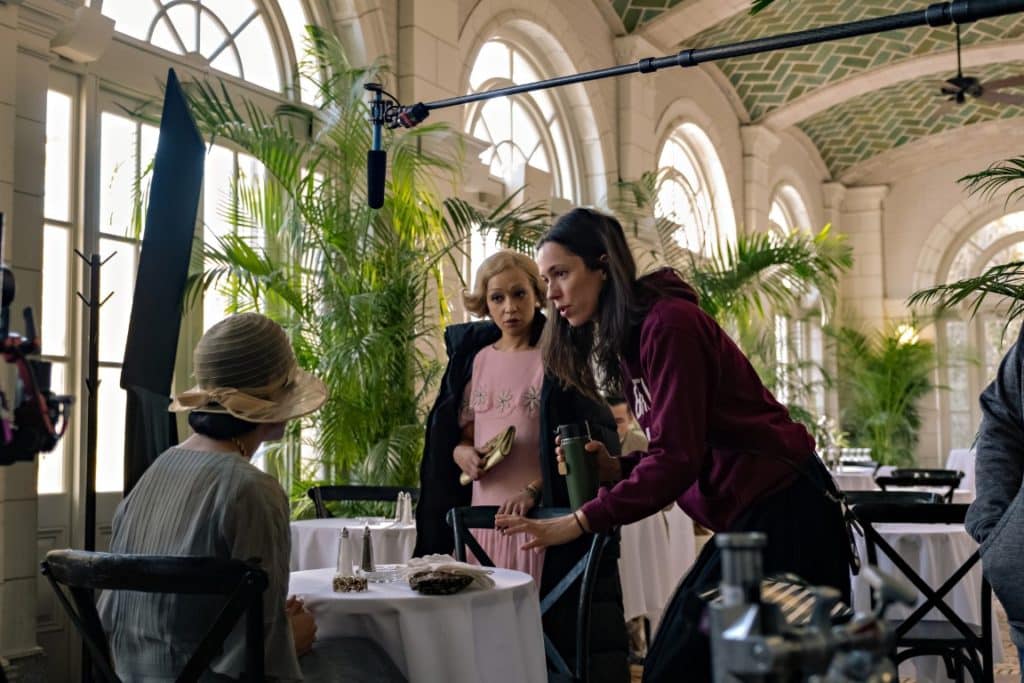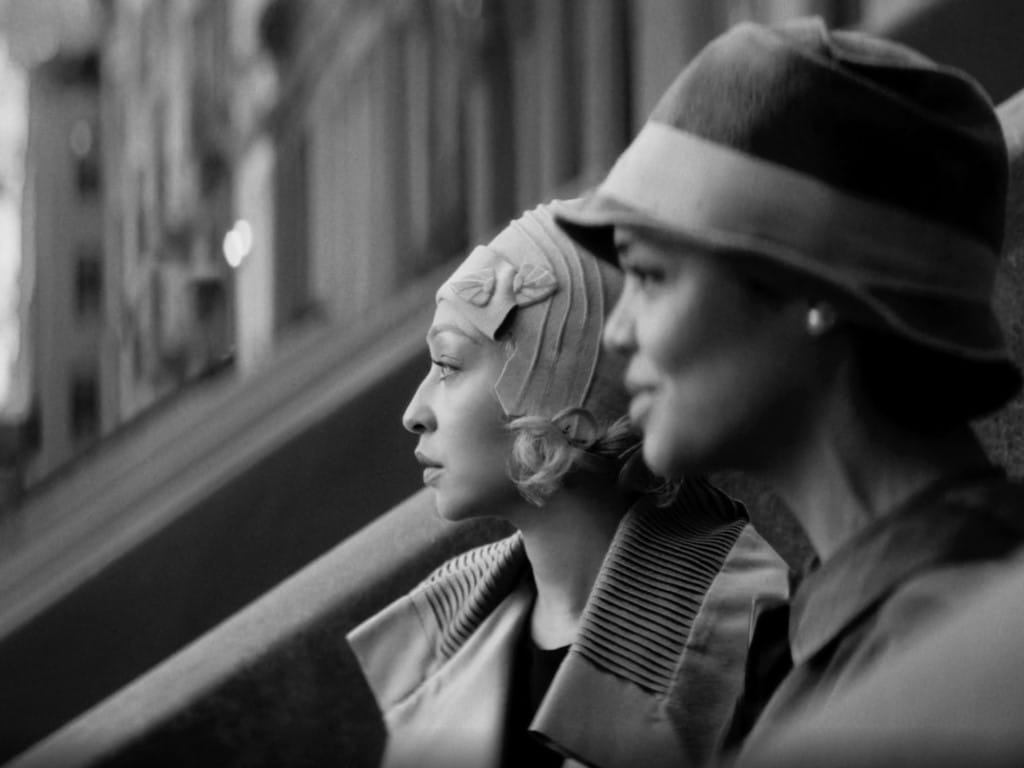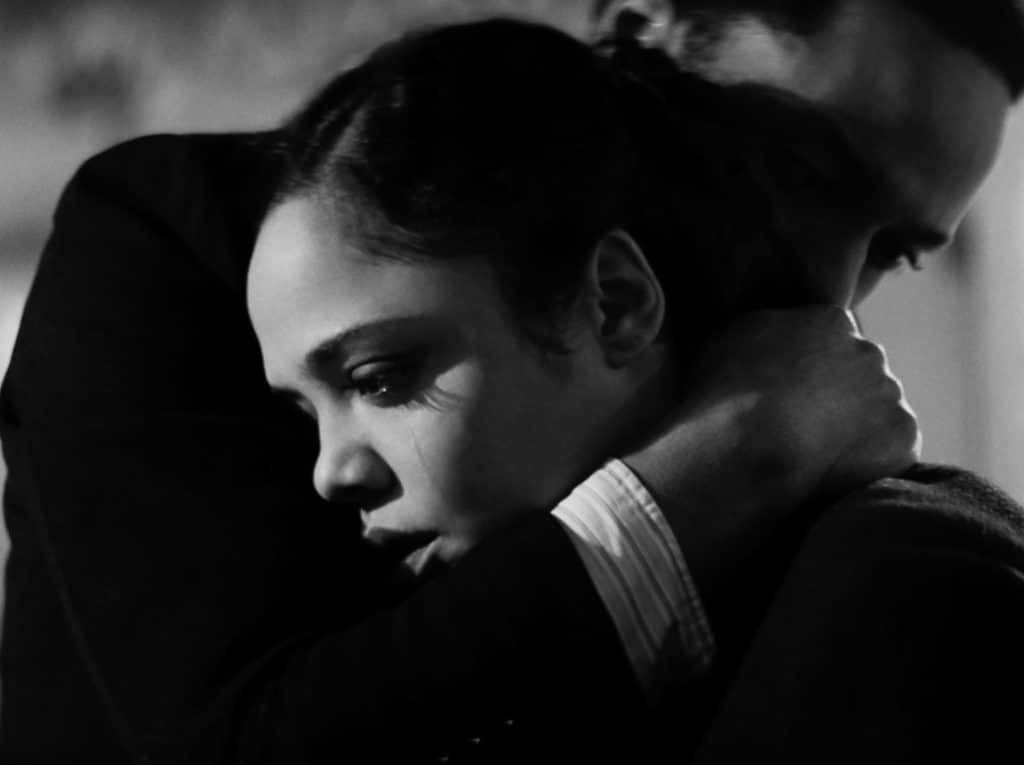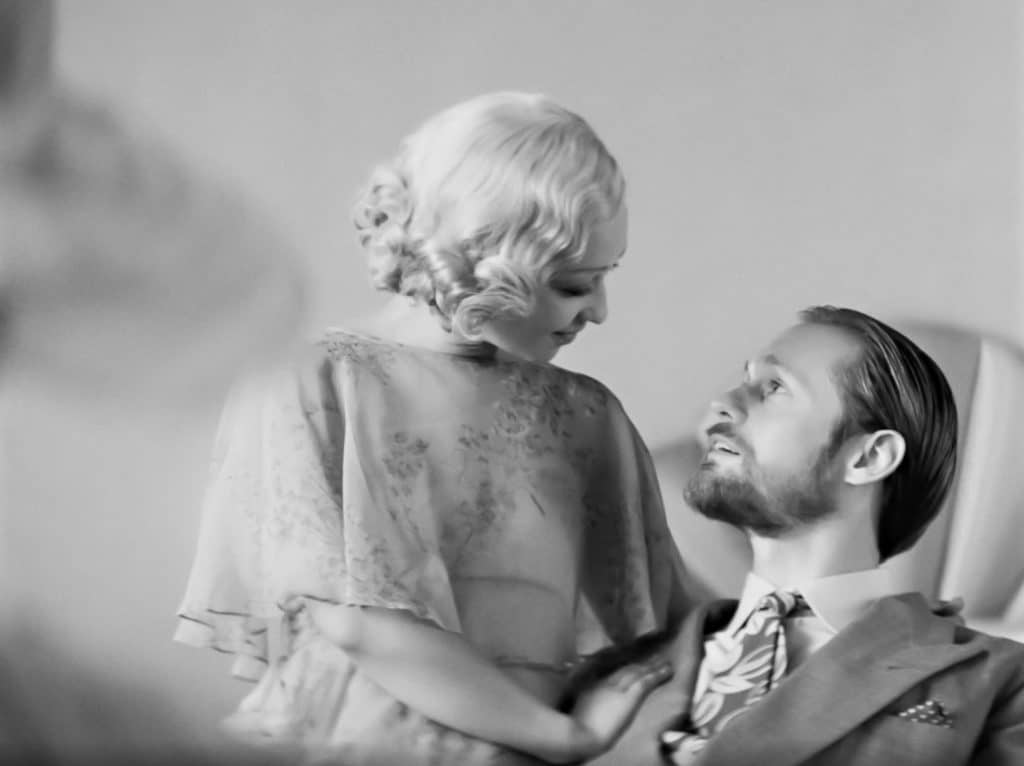The acclaimed actress and first-time director discusses bringing Nella Larsen’s novella about racial identity to the screen.
For acclaimed actress turned first-time writer-director Rebecca Hall, her debut feature Passing is more than her first furtive steps into another facet of her expanding career. It’s a deeply personal odyssey, one rooted in her own questions about her racial identity: Hall, whose grandmother is part-Black and whose mother has Black, Native American, and Dutch ancestry, has presented as white for much of her career. With this, her adaptation of the 1929 novella of the same name by Nella Larson, Hall gets to explore those myriad facets of herself, as well as the broader implications the phenomenon of ‘passing’ has for all of us in our respective negotiations with our identity.
Passing follows the story of Irene (Tessa Thompson), a married Black woman living in Harlem with her husband Brian (André Holland), and her fateful reunion with an old friend named Clare (Ruth Negga), a light-skinned Black woman who has chosen to pass for white in her public and private lives. The two are drawn to each other by a mixture of curiosity, envy, and even a splash of subtextual longing: Irene (who often goes by “Reenie”) is cracked open by Clare’s intrusion into her life, while Clare can’t help but see her proximity to Reenie as a chance to reclaim the Blackness she’s long kept dormant in her stifling white life.
It’s a scintillating debut, Hall making vivid use of 4:3 black and white cinematography to present a 1920s New York that both delineates and blurs the lines between individuals and presentations, how we see others and how we see ourselves. And what’s more, it accentuates the personal ambiguities that underlie every facet of Thompson and Negga’s superlative performances, a love story that quickly turns sour.
I sat down with Hall the evening after Passing screened at the Chicago International Film Festival, where she received an Artistic Achievement Award. It also happened to be mere hours after the film received five nominations at the Gotham Independent Film Awards, including Best Feature. Together, we talked about her history with the book, her desire to create something formally bold for her first time in the director’s chair, and the necessity of placing her audience within the Black perspective.
This interview has been edited for clarity.

It’s interesting to view Passing within the confines of the circumstances in which it premiered: First virtually at Sundance, then with a mixture of in-person and virtual screenings elsewhere. And now it’s finally coming to wide release courtesy of Netflix, where most people will view it on streaming. I’m curious about how this push and pull between in-person audiences and streaming is hitting you, especially with the eventual release of your first feature.
It’s tinged with a little bit of sadness. When you’ve been dreaming of directing your whole life, and you finally make your film — and you also make it for nothing — you don’t dream of it being on streaming. But it does have the ring of the thing that you always intended it to be, which is very improbable actually, in the grand scheme of things. You dream of your big premiere being with people. It was sad on some level, but it felt like the right thing to do. It was such an odd moment to be trying to sell a movie, right when we went to Sundance, because none of us really knew how much longer [the COVID-19 pandemic] was going to go on for. If we stood a chance selling it for theatrical, or what we should do. So it felt so true to the moment to screen it virtually.
But then the improbable thing that happened was that everybody wanted it. And I say that with some sort of relish, because I’d spent the better part of thirteen years writing the script, and the better part of seven years trying to get it made. I had people telling me firstly, you’ll never get it made. And secondly, if you do get it made, you’ll have to do it for nothing. Even if you do get it made, it’ll be so arthouse and so niche no one will see it. It’ll never sell. And if you do sell it, we won’t watch anyway! I’m not even joking there was a neverending litany of people telling me how this would fail.
So the fact that we sold it to Netflix, and Netflix also promised it a theatrical release, was huge for me — knowing we had our bases covered, that people would see it but also they would see it in the theater if, come the time, it was allowed. And now we’re here. It’s odd because you come out of our many years of isolation and quiet. I’d never seen the movie with an audience until New York two weeks ago.
What was it like to hear their response live in a theater, to feel that electricity in the room?
I did the equivalent of virtual test screenings when I was editing, which boiled down to sending it to people I trusted via a link and getting them to give me email feedback. But I come from theatre, where you learn so much not from the notes people tell you, but how much people are shifting in their seats and when they laugh. No one’s going to give you an honest note about that kind of stuff. [Laughs.] So if I’m being completely honest, it was kind of excruciating. Thrilling, but also excruciating.
But they laughed in places I did not see coming, which was great. Because the laughs told me they felt comfortable enough to express something. And also people must be feeling a lot of tension that they need to let go of.
And that discomfort that comes from all the disparate tensions played through in the film about class and race and gender, but also time, that specific Gilded Age setting. You mentioned you’ve been living with this text for so long — for decades even. What was your first exposure to Larsen’s novel?
Someone gave it to me and said, “You should read this.” It was a moment in my life when I was spending a lot of time in America and frequently finding myself in conversations with people where I can see they’re making assumptions about me based on how I look, and how I’ve always been seen in the world. I wouldn’t go so far as to say it’s how I presented because I’m not sure that I was presenting a certain way. But I found myself increasingly sticking my hand up and going, “Actually, I think I might be biracial.” Or that my mother might be Black, but she’s never had people say, “What do you mean? She’s not Black.” She’s not saying she’s Black, but she’s not Black. She’s said that maybe her grandfather was Native American, she doesn’t know.
But when this person gave me the book, she said, “You’re flailing around here. But there’s a historical context for the thing that you’re describing.”

Watching Passing and reading the novella, it’s a pretty faithful adaptation of the novel. As you went through this long process of adapting it, were there aspects of the story that you wanted specifically to expand upon or change?
I don’t know if I was that specific about it. The truth is that whenever anyone reads something as subtle and ambiguous as this text, you’re going to have an interpretation. And whatever my interpretation was, was what I expanded on. And for me, the thing that really got me about the novel was not actually the racial metaphor so much as the fact that it becomes a metaphor for all the ways in which everybody is in negotiation with themselves about their identity. I think there’s the story society puts on us, and the one that we tell about ourselves. The two can sometimes be in real conflict. I think Nella Larsen is constantly setting up a world full of these binaries. We’ve got Black and white, obviously, but we’ve also got man/woman, gay/straight, and she’s exploring that all the time.
And rich and poor as well, given Reenie and Clare’s disparate economic modes.
Yeah, absolutely.
I love that innate tension that it brings out, especially in Reenie, where there’s this Persona-esque mixture of envy and adoration and romance when it comes to Clare’s intrusion into her life.
I think Clare unlocks Reenie’s sensuality because I don’t think she really has any sense of who she is, right? She’s so rigid in her performance of doing the right thing. That’s really the critique. There’s a danger in that kind of rigidity: If you’re so busy performing the best version of yourself, then the thing that you actually want and desire can get lost. Which gets heightened if you’re a woman of color and operating in various systems that are built to suppress and repress you.
And when Clare comes in, she’s able to, in Reenie’s eyes, navigate those spaces with greater alacrity.
Exactly.
So much of that is down to Thompson and Negga’s performances, which I have to imagine was a treat for you to work on, especially as such an accomplished actress yourself. What was it like working with them as a director with such a strong actor’s perspective?
It was a funny combination of quite rigid form, in terms of filmmaking, and freedom. I said to them at the outset: This is a stylized movie, everyone is passing in this movie, including the movie itself; it has its own performance. And the shots are composed, I have storyboarded a shortlist of everything. The 4:3 is very restrictive. So if you don’t stay on your mark, you’re literally going to wander out of the frame. Everything is composed so specifically that sometimes you’re both in the same shot, and sometimes one of you is looking at the other and the other one isn’t. You can have these glimpses of how you are affecting each other on an unconscious level, underneath what you’re saying. So I’m going to be prescriptive about the blocking, and the shorts and the tempo, and the rhythm of the scene.
But within those boundaries — and this is a film about boundaries — it might feel good. I want you to have complete emotional freedom, as long as we’re all on the same page about the subtext.

And those limitations give you an infrastructure to work with, which is really interesting. I think a lot of actors turned directors move to something very naturalistic and improvisational a lot of times with their films, so it’s really admirable that you took this bold, formal step right away and tested yourself as an artist.
I suspect it’s the kind of filmmaker I am. I don’t really know any other way. It’s just that it’s what interests me. Right? I don’t know, composition and form and all that stuff is what interests me, but I think that says something.
In addition to the cinematography, another thing that struck me was the score by Devonté Hynes. Talk to me about the process of building that score, this swaying, jazz-inflected work that evokes the Harlem Renaissance. For instance, I find it very interesting that the music doesn’t really come in until the movie explicitly tells you these characters are Black.
Yeah, that’s true. I really wanted to make a counterintuitive choice here, because everyone has this understanding of the ’20s as this sort of loud, noisy, Jazz Age. But that’s not actually this worldview. If we’re trying to crack into the interiority of someone who’s not easy to crack, we have to find ways to get inside Irene’s head without explicitly saying what she’s feeling (because it’s not even available to her).
A lot of this was sound design, actually, and music. It has to be quiet because her worldview is narrow. She only sees this little block of street; she has the same monotonous domestic chores, but what she hears and doesn’t hear is very specific. When she first experiences Clare, before she even really sees her face, she sees her crossing her legs, and the sound of her stockings. That’s a piece of foley that I hunted down for ages, to find the most sensual-sounding piece of stockings rubbing against each other. It’s far louder than it would naturally be in the distance that Irene’s sitting at. But the point is, she feels that immediately in a way that she doesn’t necessarily hear something right next to her. These tiny details incrementally add up to you being inside Irene’s head.
As for the music, I really wanted it to be quiet. I ended up doing three sound mixes because it still wasn’t enough. I kept saying, “No, there needs to be absolute periods of uncomfortable silence, so you can have time to let the complexity live. Otherwise, it’s gonna get crowded.”
But aside from that, I heard Emahoy [Tsegué-Maryam] Guèbrou, this Ethiopian pianist who plays the tinkly piece of music you hear all the way through. It’s really the only piece of score, actually, and Devonte didn’t write that. That’s this Ethiopian pianist who has been in exile most of her life, and is now 97 and living in a convent. She released an album in the ’60s called Ethiopiques, vol. 21: Emahoy, which was part of the Ethiopique jazz movement. I heard that piece of music [“The Homeless Wanderer”] and I thought, “Oh, that’s what the movie is. That’s how the movie feels in my head, this piece of music.”
And when Dev came on board, I told him that “The Homeless Wanderer” was the music of the movie. But if we’re talking in terms of themes, it’s Clare’s theme but stuck inside Irene’s head. She can’t escape it, and it’s monotonous. What I wanted him to do was write Irene’s theme, which is real in the sense that it’s practical. It’s a guy across the road, learning to play the trumpet. At the beginning of the movie, he’s good, but can’;t find his voice, so he’s doing scales. But by the end, he does get his voice, and it sounds like “The Homeless Wanderer.” It’s background, but it’s crucial, and everyone in the movie comments on this trumpet player. That’s what Dev had to do: Find a way to weave that together. He also at points sweetened and changed “Homeless Wanderer” to make it occasionally different and more frightening. All that stuff was very very deliberate.

So much of the film’s subtextual fabric is, obviously, about passing and the links between Black and white presentations. And I find it really interesting in terms of the casting that you chose two actresses who, without the black and white conceit, would not pass for white. It feels really challenging in terms of its placement in not just the history of the film’s setting, but of the aesthetic blinders white people often have towards Black people in terms of their presentation; especially as the other white characters try almost deliberately to not clock them as Black.
These things, more often than we like to think, are about context. We all love to play this game of, “This is what I’m seeing, and everyone can see exactly what I’m seeing.” But guess what? They can’t; everyone sees something different. In the beginning of the movie, when both of these women are sat in, you know, what I termed ‘white world,’ the hotel room, that’s deliberately, oppressively white. That’s what black and white gave me. And that’s because the person with the most power in the room is John (Alexander Skarsgard), the white man. He gets to see what he wants to see.
In that context, he is making them white, because that’s what he wants to see. It’s much more interesting for you as an audience member to see them as Black all the time regardless of what everyone else is saying, because it raises the tension, the stakes.
It also puts you in the Black perspective. That was very important to me. On another level, it didn’t make sense to do what other films about passing narratives have done in the past and cast white people. Because that feels like it’s pleasing a white audience, obviously.
You’re on the tail end of this incredible, long journey, both of self-discovery and your first experience as a director. Did you discover anything new about yourself as an artist during this process?
At the beginning of the process, I wasn’t a director or writer officially, and now I’m both. Honestly, it’s a sea change in my life, I suppose, on a really basic level. I learned that I loved it, and that this is actually what I should be doing. I’m not going to give up acting; I love acting. But this is part of it as well.
Passing is currently playing in select theaters and comes to Netflix November 10th.